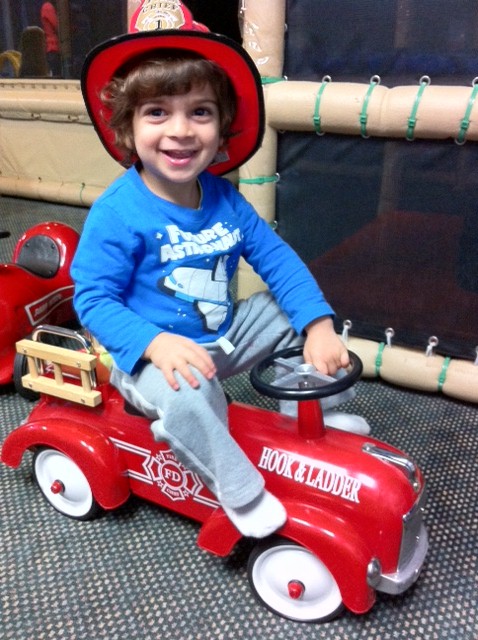Speech and Language Developmental Milestones at 3-4 years:

- Children use 900-1000 different words.
- Children use sentences of three or more words: (e.g. “I want to go.” “I go to school today.”).
- Children ask questions like “Who is that?”, “Where did it go?”, and “What do you have?”
- Children talk about experiences they had in the past (e.g. “Remember, we went to Grandma’s house?”).
- Children enjoy telling simple stories.
- Children may not produce all sounds correctly, but put sounds at the beginning and end of words.
- Children speak clearly enough for people outside of their immediate family to understand them most of the time.
- Children enjoy pretending with their toys: (e.g. pretending to cook a meal, feeding a favourite doll).
- Children pay more attention to print, both on the pages in books you read together, and in signs and lists.
- Children follow two-part directions like “Go to the kitchen and get your back pack.” without gestures.
How to make daily routines into language learning opportunities
- Language learning happens all day long. At this stage, children are learning language very quickly and during everything they do throughout the day.
- When going through your daily activities, try to find some time to encourage children’s creativity through pretending. Children can pretend that they are a server in a restaurant, or a parent of a favourite doll.
- Children, at this stage, enjoy being a helper. Give them small chores to do. This helps them feel good about themselves and also gives them opportunities to learn a whole new vocabulary.
- During meal time, dressing time, and bath time encourage children to talk about what they are doing, and which clothes and foods they prefer. You can use vocabulary like, “Watermelon is juicy, but bananas are squishy.”
- You can plan what you have for dinner and encourage children to join in the conversation. They can talk about the food they like and you can help them to talk about categories of food (e.g. “Apples are fruit.” “Corn is a vegetable.”).
- Give children choices throughout the day. This helps them to become more independent and gives them opportunities to use their words and sentences. (e.g. “What would you like to wear today? It’s raining, so what do you think you need?”).
- Children at this age know most of the words of the songs you have been singing and enjoy leading the singing. Don’t worry if the words aren’t just right. It’s the singing, the sharing, the taking turns and the new words and actions that are most important. When you repeat these songs many times, children learn the correct words, in time. You can learn new songs and rhymes by visiting your community Ontario Early Years Centre where there are programs for babies, toddlers and preschoolers and workshops for parents, at no charge.
- Children at this age look like they are reading the words in their favourite books. If you have read a book many times, children have learned the words and take great joy in “reading the book” to you. Encourage children to learn about print by pointing out the letters on the page. Don’t be concerned about teaching the letters at this stage.
- Children at this age love to sing songs and participate in the song. Songs such as “Row, Row, Row Your Boat” and “The Eensy Weensy Spider” provide both fun and language learning opportunities. After you have sung the song or rhyme many times with children, wait for them to fill in the words at particular points during the song. You can learn new songs and rhymes by visiting your community Ontario Early Years Centre, where there are programs for babies, toddlers and preschoolers and workshops for parents, at no charge.
- Children at this age like to read books to dolls and stuffed animals. Reading books with children every day will help their language develop.
- The libraries offer story times for preschool children. This is a wonderful opportunity for you to learn about a variety of children’s books and to meet other parents in a fun, interactive environment. A visit to your public library for baby story time is a good way to get ideas for reading with children and to meet other parents. Library story times and other activities are listed on library websites such as London Public Library, Middlesex County Libraries, Elgin County Libraries and Oxford County Libraries.
What are the best ways to encourage speech and language at this stage?
- All children need to have a variety of experiences. When they go to the park, the library, or just play with a variety of toys, they can have something to talk about.
- The more experiences children have, the greater the chances for them to learn new words.
- Children at this age are now starting to speak like an adult, but sometimes they need extra time to think about the words they say. Give them time to express themselves.
- Children find it easier to express themselves, if you help them to learn words for feelings. It may result in less frustration for both of you.
- Children are using longer sentences. You want to use complete sentences, with correct grammar. Children may still be using child-like grammar, (e.g. “I dood it.”) Instead of correcting them, say it back, using the correct grammar. (e.g. “Yes, you did it.”).
- Children like to hear stories about their daily activities. Talk about what you have done together during the day, giving them the important words that help them talk about their experiences.
- If you have a camera, take pictures of the special things you do together, and talk about them. Let children tell the story and you can write it for them. Help them to understand that the words on the page are the same as the words they are saying. For more information on helping Children learn language visit The Hanen Centre ©.





